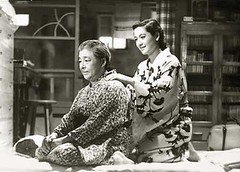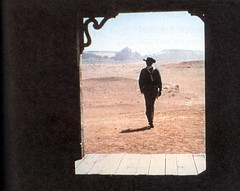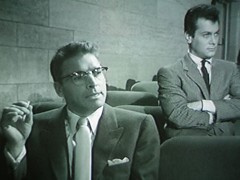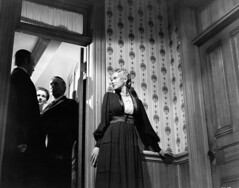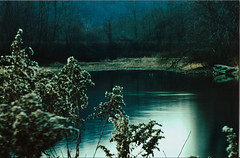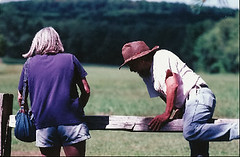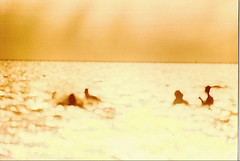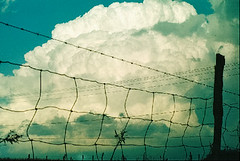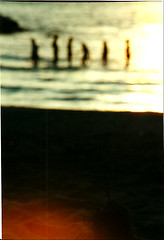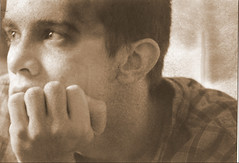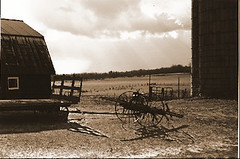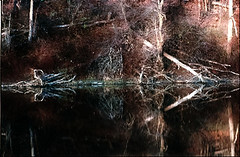Tokyo Story (1953)
Dir. Yasujiro Ozu
Writ. Kôgo Noda, Yasujiro Ozu
w/ Chishu Ryu, Chieko Higashiyama, Setsuko Hara [1]
Yasujiro Ozu's Tokyo Story punctuates the last in a seven-year run of movies made between 1947 and 1953 at the rate of one per year. [2] Known for his evolved and deliberate style and his devotion to capturing post-war Japanese middle class life and locales, the filmmaker creates a new genre using unique camera work and editing. Using lots of long shots, which are made to seem even longer than they are with slow pacing and an avoidance of intercutting close-ups and medium shots, and shooting more often than not with a shortened tripod, he evokes the postures and attitudes of the working Japanese in routine, social customs. The focus of this particular film is a mostly immediate family that is experiencing a rare visit from its patriarch and matriarch who have trained from the comparatively tiny village of Onamichi to post-war Tokyo, a burgeoning city. In many ways, the hustle and bustle of the city serve as a subtle contrast to the forced deliberation of the scenes and the narrative, which is also a fresh take on storytelling.
While providing a backdrop in which Ozu can use his documentarian style of filming, the city also poses as a catalyst, backing up one of the great central themes of Story, which is change, both the resistance to change, and the acceptance of change. His approach to this idea is complete and resonates on many different levels, the most basic of which can be identified by his near-absolute avoidance of match cuts to create a 360-degree sense of space as opposed to the typical, linear 180-degree format with which most people feel more comfortable. His static sets tend to use something transient such as smoke from a mosquito coil or chimneys to visually reinforce this theme. Within the construct of the family itself, the characters are shaped dramatically by the same idea as older members of a generation try to adapt to the adult lives and personalities of their children and vice versa. The setting of the story encapsulates all of this very neatly as the general climate of Japan in '53 struggled to adjust to the changing times of a new industrialized, democratized post-war entity.
Thanks to this innovative filming, the grating qualities of the conflicts here are both studiable and made more interesting. Because the compression of the shots and the narrative ellipses are designed to make the audience pay attention to what's going on, Ozu has plenty of space and time in which to convey a great deal of implied subtext within the conventions of Japanese society. In other words, while each of the characters involved are both resisting and dealing with the changes that each one faces, they all must also conform to the customary politeness which is the fundamental basis of their culture. The director further invites us to speculation as to whether or not this aspect of tradition will last in the future, in part by presenting three generations of a family, each level of which clearly has different notions of respect and intimacy and relationship in general, both with themselves and the world at large.
Needless to say, it's a huge hunk that Ozu has bitten off, but a task that he undertakes with great care and thoroughness. It can be a bit disorienting at first watching such a departure from traditional filmmaking, but worth a close look. The shots seem longer than they are and parts of the story are omitted, but that's just Ozu deliberately tugging on his audience's attention span. Depending upon your point of view, this will either lean towards the magnetic or make you a bit sleepy.
* * * * * * * * * * * * * * *
[1] You shouldn't need to be a filmmaker to know that this is very prolific. In Ozu's case, he had an in: his uncle got him a job as an assistant cameraman at Shochiku studios, which is a very nice springboard for any aspiring, poor filmmaker, especially the son of a fertilizer merchant. Not that that's necessarily the reason for such a run, but it helps.
[2] The young woman in the photo, Setsuko Hara, has been called the Greta Garbo of Japan.
